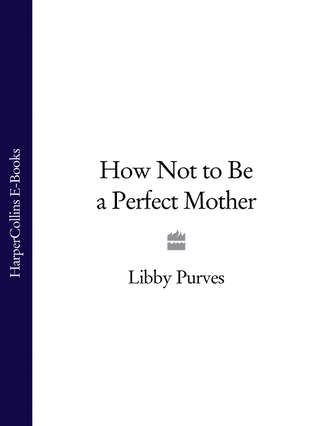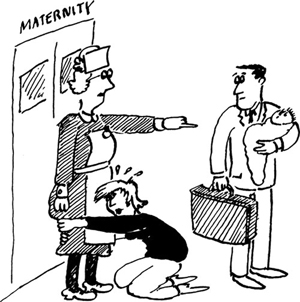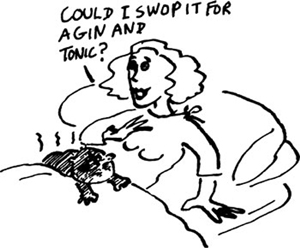
Полная версия
How Not to Be a Perfect Mother

Chapter Two
Hard Labour: Birth
My first child was born in November, when the sellers of Remembrance poppies were out on the streets. I was days overdue; one gloomy evening, my mother-in-law rang for a bulletin. ‘Have they come yet,’ she enquired lugubriously, ‘to take her away?’ On being told that they hadn’t, her response was electrifying. ‘Aye,’ she said, generations of old wives’ lore quivering in her voice. ‘I bought a poppy t’other day. I thought of Libby.’ And having thus memorably equated my coming confinement with the mud, blood and mortality of the trenches, she left us to wait on, amid the howling winter winds and the chilly fog curling off the river.
We were glad of it, really. It made a nice counterpoint to the breathless optimism of the National Childbirth Trust classes, where an upbeat teacher had stripped away all the mystery from the abdominal events to come, trained us never to refer to ‘pain’, and generally raised our expectations. We had been comfortably looking forward to a supremely interesting, mildly tiring Life Experience, and it was salutary to be reminded of the other point of view: the howling, heaving and bedpost-gripping made familiar by a hundred historical novels, and warned of (with graphic hand gestures) by generations of grannies.
For years they told us that when A Woman’s Time Has Come, she moans and grips her husband’s hand; then comes an interlude of black terror, screaming, sweat, agony and struggle; followed by exhaustion necessitating a month in bed and a ritual visit to the nearest temple for purification of her foulness. Old bags in launderettes still mutter joyfully about Auntie Helen who was Never the Same Again after what she went through with her second; about Our Brenda who never had a day without pain (and it was Twin Beds from the day she came out that hospital until the day he passed on, the dirty beast); about dropped bits and ruptured bits and Specialists down from Lunnon who had never seen anything like it in 40 years. The advantage of this great female legend in its heyday was presumably that when the terrified young girls actually came to have babies, they found it nowhere near so bad as they expected; and in their subsequent relief felt positively light-hearted about the few residual aches and pains. The disadvantage was (and is) that the more frightened the mother, the worse it hurts. The legend was thus enabled to live on, with ever more refinements of detail (‘Ooh, you should have seen my stitches. I tore 3inches. Doctor said he’d never seen anything like it …’).
The great legend took a bashing with the advent of the childbirth movement. New childbirth, natural childbirth, Birth without Fear, whatever you call it, the symptoms are much the same. They include a refreshing blast of technical knowledge, a refusal to admit that it hurts much and, at the more extreme limits, the claim by Sheila Kitzinger that ‘birth is the most exciting sexual experience of a woman’s life’ (depends on all the others, I should say … ). The new prophetesses use ‘birthing’ as an active verb, admire Leboyer’s vision of a child drifting into the world to gentle music and dim lights and warm water and love. They point with enthusiasm at Michel Odent’s squatting, naked mothers and athletically involved fathers at the Pithiviers clinic, and publish books of exercises to stretch every useful muscle. They write blow-by-blow accounts of their own beautiful labours, surrounded by friends playing guitars, nourished by ancient honey-and-raspberry-leaf infusions, and culminating in the joyful eating of the placenta in an iron-rich stew.
This approach, like the other one, has its disadvantages for the nervous, bone-idle, easily confused primagravida. The pursuit of knowledge is useful; being urged to frenzied activity during labour is a very good thing. (Hospitals ought to have ping-pong tables. At least husbands might, for once, let their wives win as they approach 5 cm dilation, and it would be less boring than flinging yourself on a beanbag.) And the scorn poured on painkillers has at least stopped medical staff from their famed practice of shooting women full of pethidine to make them shut up groaning.
On the other hand, all that fulsome praise of Nature tends to infuriate the large minority whose babies, in Nature, would not have had a lot of fun getting out; Caesarean, drip induction, epidural anaesthetic and forceps victims have developed a tendency to complain bitterly about being ‘cheated of the experience of birth’, which must sound incredible to the howling-and-bedposts school of obstetrical fantasists. Like complaining about being cheated of the rack or the thumbscrew. Almost as bad is the awful guilt, felt by the likes of me, that no baby can have a calm and silently magical Leboyer delivery if the first sound to assail its little slimy ears is the sound of its mother swearing like a Billingsgate porter and punching its father in the neck.

Now, on top of this struggle between the earth-mothers and the doomsters, comes a sneaky but influential lobby which says ‘Look, spare yourself the hassle, keep the diary tidy, go for an elective Caesarean.’ Earth-mothers, and some doctors, are outraged by the ‘too posh to push’ lobby; however, you may come under subtle pressure from mothers who chose Caesareans for psychological or social rather than medical reasons. Don’t give in without thinking hard: a Caesarean is a serious, major abdominal operation; you will take longer to recover, be unable to drive or lift heavy things for weeks, and compromise your chances of having a natural birth later. Infections, even fatalities, are not unheard-of. It’s a safe enough operation if you need an op, and preserves many lives; but if you don’t need it, it is not an option to take lightly. Perhaps the most disgraceful example of medical advertising ever was the US ad for Caesareans beginning ‘Keep your tubes honeymoon fresh!’
On the whole, reading ‘birthing’ books is more useful than listening to your mother-in-law delivering the Gypsy’s Warning, or your overconfident friends telling you how their system was best (all mothers have to think their own choice regarding babies has been best, at every stage. It’s a safeguard against the gnawing guilt we all feel most of the time. You learn to discount it). When it comes to choosing which hospital, you can get some good information from friends, though, and the underground network of mothers’ groups, and the hearsay evidence of your classmates at the heavy-breathing sessions. I heard, this way, that a certain hospital has one obstetrician who is gay and can’t stand the sight of women’s breasts; that another plays country ‘n’ western muzak in the delivery rooms (babies’ heads, emerging, feel exactly as if they had concrete Stetsons on anyway, without any such uncomfortable musical suggestion); and that yet another hospital has a tendency to bring in six medical students at a time to gaze at your perineum and gasp at your language. (The woman who told me this had actually raised herself on her elbows, between pushes, and demanded ticket money from the growing crowd at her feet. Two of them were so startled they actually began fishing in their white coat pockets.) At least if you know all this, you are prepared.
One awful warning came my way about home births. These are so difficult to organize, for a first baby in Britain, that one couple dedicated two months of lobbying, changing doctors, persuading and campaigning to win permission to be tended at home. Finally they got it; and as soon as the thrill of the chase had worn off, misgivings set in. The woman confided, a little shamefacedly, that in her excitement at beating the system, she never once thought about the work and disruption it would cause – not to the medical staff, but to her own house. On the day she got the official list of things to prepare (like high blocks to put the bed on, and vast quantities of plastic sheeting for the bedroom carpet) she longed to recant, but didn’t have the face to. Her husband eventually spent half the delivery night clearing up, and the next morning washing the dozen teacups and biscuit plates emptied by the community midwife (the doctor had most of the Scotch afterwards). Both parents, occasionally, still have wistful thoughts about nice clean hospitals with unlimited laundry and professional tea-ladies.
My own husband, having cheered me on through two hospital deliveries and revelled in the fact that someone else would clear up, now says after ten years of farming that these matters are best carried out in outdoor lambing-pens, with all present in Wellington boots. So, round here, only sheep are allowed home births.
(I should admit, though, that I am not the most impartial person to discuss home births. With my first child, I discovered to my shame that I am a complete hospital junkie; I loved every moment, became institutionalized within two days, had to be dragged out, complaining, at the end of eight days; and for months afterwards, I indulged in yearning fantasies about going back to the lovely maternity ward. One weary night, when Rose was two months old, I announced this longing; my husband asked, ‘What is so special about hospital, for heaven’s sake?’ and I apparently sobbed: ‘They bring a trolley of laxatives and sleeping pills round at nine o’clock sharp every night. I never actually have anything, but at least it shows that someone cares.’ Mystified, the poor man took to offering me a laxative every night, just before the nine o’clock news, to show he cared; but it wasn’t the same, somehow.) But then, I was lucky in my hospitals. Not everybody is; and more recent practice is to chuck the new mother and baby out pretty sharply after the birth, to go through the rest of the recovery stage at home.

So, to the birth itself: every birth is slightly different. All I can usefully say is: beware of Legends, and beware of Irrelevant Campaigns.
Legends
‘A woman always knows when she is in labour.’
Oh no, she doesn’t. Hospitals get women arriving two minutes from birth, still wondering vaguely if anything is amiss; and countless others turning up a fortnight early with indigestion and nerves. Keep an open mind about it, and don’t be too easily fooled by the spectacular Braxton-Hicks contractions which sweep over you while you’re watching Big Brother.
‘Your waters will break, embarrassingly, in thesupermarket, with no warning at all.’
Well, they may. Possibly. It is still not worth going around for weeks on a knife’s edge of uncertainty, avoiding supermarkets. I drove down for some Sunday papers just before Rose was born, and suddenly found myself sitting on a sodden car-seat. Panicking, I drove carefully home again, feeling false labour pains rack me every two minutes, and shrieked for my husband, for an emergency babysitter for my elder child, for pethidine or a Caesarean or a community midwife or anybody at all. Paul leaped into the driving-seat, paused, and began to laugh immoderately. ‘My waters have gone as well,’ he gasped. Before any domestic violence could set in, he explained: someone had left the car window open in the rain overnight; the water had soaked deep into the foam upholstery; the seat was now dry to the touch, but immediately became soaked when someone sat heavily down on it. Strained laughter all round.
‘When you are ready or overdue, you can induce the baby naturally by massaging your nipples.’
It produces some useful hormone, they say. But only if you do it for several hours. There are few things a hugely pregnant woman feels less like doing than massaging her nipples all day. Take my word for it.
‘A bumpy car ride will bring a baby on.’
It would have to be very bumpy indeed, if 20 miles round the Lincolnshire back-lanes in a reconditioned Russian army motorcycle sidecar failed to have any effect on my sister-in-law in the 41st week …
‘When the moment comes, you will feel anoverwhelming urge to push.’
I would never have dared to dismiss this great universal belief until I had my second baby without feeling the remotest wish to push anything at all. Since then, I have met other women and got them to admit it, too. We all pushed our babies out quite efficiently, waiting for contractions and just doing it; but felt no urge, just a sullen boredom with the whole process, and a desire to get it over with. Nobody should be bullied or stereotyped by everybody else’s biology.
‘You will be overwhelmed by love and wonderment at the sight of the baby, newborn and laid on your stomach.’
Well, you may be; once out of two births, I was; the other time I was being sick and fancied a cup of tea more than a slimy baby. This is no tragedy; my husband held both of our newborns straight away, while I got myself together, and there were no ill-effects on any of us. Which leads to the most dangerous legend of all …
‘For a mother to hold and suckle her child immediately is essential to the “bonding” of mother and child. If a mother is stopped from doing this, she may suffer postnatal depression and her relationship with the child will not develop.’
This is an awful thing to say to a mother who may end up under general anaesthetic, or ill herself, or with a desperately sick baby in an incubator. What is she supposed to do? Bond with the tea-trolley instead? Human beings have brains and hearts as well as bodies; it is time the ‘bonding’ lobby admitted this.
It is an even worse thing to say to a mother who has no medical crisis, but simply doesn’t want to hold her baby instantly, after her hours of exhausting labour and months of exhausting pregnancy. Why the hell should she? When my happy, healthy, untroubled baby daughter, now the apple of my eye, was first born I took one look and said, ‘My God, it looks like a bloody shark’ (which she did: underslung jaw and peculiar squashed nose). I let my husband do the cooing. After 20 minutes I fed her, quite successfully; then she went to sleep and I was wheeled off to a side ward. The nurses came in agitatedly, to say that my ward was too cold for a newborn, and they couldn’t find a heater; could they possibly leave the baby in the warm nursery until morning? Would it upset me? I said no; and Rose’s first night, fast asleep, was not spent beside my bed. With the first baby, he and I had lain staring at one another for six hours, wide awake, and that was very nice too, in its way; but as for ‘bonding’, it made no difference whatsoever. Of course it is unfortunate to take a new baby right off to an incubator or a nursery for hours; but it is just as unfortunate to expect a tired, cross, sleepy woman to put on a big act of instant love for her baby when she doesn’t feel like it. Love comes more slowly than that, to many women; you can depress a mother horribly by making her feel like an unmaternal monster for not cooing and staring into the cot all the time.

Irrelevant campaigns
No offence intended to the campaigners; but there are certain, once excellent, causes which have become rather bigger than the problems they set about solving. In my first childbirth, I was educated by the pioneering books on natural birth, and fired by the feminist spirit. On my first visit to the clinic, almost my first words to the surprised midwife were, ‘I’m not having an enema, you know!’ I vowed to chain myself to the hospital railings before I submitted to a shave (‘ritual humiliation of women’), I argued about episiotomies when I was only two months gone, and recited statistics on induction and its fearful side-effects to any baffled trainee midwife who would listen. I cornered obstetricians at parties, jeering about foetal heart monitoring and scalp-clips while they tried to spear sausages on toothpicks; I was a terrible, terrible bore.
Quite rightly, I got my come-uppance on the day. For impeccable medical reasons I was induced, put on a drip, and prescribed an epidural anaesthetic to keep my blood pressure down; and a slightly distressed baby was rescued, hale and hearty, by way of a lift-out forceps delivery and an episiotomy. I had the enema and shave quite willingly because I happened to like the rather bawdy, extrovert old midwife who offered them; as for ritual humiliation of women, Sister Hubbard would not have put up with any of that for a minute. (Her own technique of ritual humiliation of arrogant young male doctors on the ward was wonderful to behold.)
The irony is that, when it came to the second birth in a very liberal, natural-childbirth-minded hospital, I spent half my labour saying things like: ‘What about an epidural, eh, nurse? Are you sure I shouldn’t be shaved? If a little episiotomy would speed things up, I’m sure … Suppose you broke the waters now, eh, doctor? I’m sure I should have had a colonic irrigation by now …’ In short, I was an even worse bore. I had no anaesthetic at all, except for a happy interlude with the gas-and-air cylinder (a pretty exciting experience for a girl who has gone nine months without a drink); I had a tear instead of an episiotomy, and felt no particular difference afterwards.
The moral of all this is: relax. Or, if you want, be a bore. The great thing about childbirth is that it is the last time you can behave appallingly, swear, lay down the law, shriek, groan and bash your husband in the chest, and be forgiven. You are the star, the primadonna; make the most of it. Once the new star arrives, to the sound of your last furious swear-word, you will have to behave again, and be gentle and self-sacrificing. Enjoy your last fling.
Practicalities
Hospitals give you lists of things to bring with you; the one thing never mentioned is paper knickers; or, if you can’t find them in the shops, the worst old Mummy-pants in your drawer, to throw away. Take 20 pairs, and you’ll never regret it. And however lissome you are, this is absolutely not the moment for thongs. Enough said.
Understandably, hospitals don’t encourage you to bring anything much into the delivery room, but various groups like the National Childbirth Trust will recommend amusements and comforts, ranging from sponges to light reading. Here are some less conventional items that women have taken into the delivery room and been glad of:
• A pair of thick woolly socks (hot face, cold feet).
• An aerosol spray of ‘Fresh Air’. (One friend says, ‘I farted like a mad thing all the way through, very embarrassing smell.’ Sorry.)
• A small plastic plant-spray for when your husband gets bored with sponging your face all the time.
• A cassette machine of music. (But beware. Just as the obstetrician approached with his forceps to extract my first, Paul switched on our machine to take my mind off it all, and it happened to be set at a sea song: ‘Haul away Joe’. Not very tasteful, but it made the doctor laugh.)
• A camera. (Pictures of your baby at ten minutes old are wonderful. For some reason they look more grown-up than a week later: wise and amused.)
• Lip salve.
• A guitar. (One girl tried to get permission for a Hammond Organ, but failed.)
• A mirror (to watch the head born, if you fancy. I don’t).
• Harpers & Queen. (Not a magazine I normally read, but Jennifer’s Diary, performed in a high posh voice by Paul, kept me laughing immoderately into the gas-and-air mask right up to the start of second-stage labour.) Hello or OK! magazine would do as well. Nothing serious is going to get through your defences, so don’t assume this is the moment to tackle Stephen Hawking for the first time.
• A laptop and a stack of DVD films (if you’re that techno-friendly. Anything with Goldie Hawn in it is a good bet, I am told).
• A picnic for afterwards (miss hospital mealtimes and you’ve had it for six hours).
• A Marybean (tropical seed from the West Indies, believed to be lucky in childbirth).
• A horseshoe (same reason).
• A game of Scrabble. (But one mother reports that it easily gets a bit close to the bone. ‘Blood … conception … tubes … then we gave up!’)
Above all, or instead of it all:
• A father. If he won’t come, he won’t, and a girlfriend or sister or mother would do. Better a willing partner than a groggy, reluctant one. But if the baby’s father will come, he might surprise you: men are often so good in the labour room, contrary to daft old legends, that the midwives are lost in admiration. (It can go too far, even. The young nurse breathed admiringly to me, after Rose was born, ‘Your husband is wonderful. Anyone would think he had been at dozens of confinements.’ I replied, a little sourly, that this was unlikely. Unless he has a hobby of which I know nothing. Perhaps he slips on a white coat and creeps into maternity wards on his days off.)
Afterword
The days in hospital with a newborn, and the first fragile week back home, are a strange, limbo-like time. Selfishness is absolutely essential. Don’t keep trying to please everyone; it’s your time. If you don’t want a difficult relative to visit you, say so. One girl, who had lost a baby at four days, had suffered all through her second pregnancy from her mother-in-law’s insinuations about genetic defects (‘If it happens once, it’ll happen again’). She was frantic to keep this dreadful old bag away, at least for five or six days; but had been advised by all sorts of well-meaning professionals that hospital visiting was vital to ‘family bonding’. I am afraid I sneakily advised her to hold her ground, and, if necessary, ban her own mother as well, just to even things out diplomatically.
Accepting help is also essential. Independent, strong, healthy women feel stupid at being brought meals in bed and having their babies’ nappies changed by nurses, or back home by kindly sisters-in-law or paid maternity nurses. But take advantage. If you looked around in an old-fashioned hospital where mothers stay in for several days, you could always tell the first-from second-time mothers on a ward; all the novices would be struggling tearfully with the fifth nappy of the morning, sticking pins in themselves and annoying the baby, just to prove they can cope. Meanwhile the old lags lie back on their pillows, murmuring, ‘Well, sister, I do have a little backache, if you’d be terribly kind and change him I’d be so grateful …’ They don’t have to prove that they can cope alone. They’ve done it. Anyway, everybody, except the very subnormal, can cope alone eventually, tough though it may be. Why start work early when you could be lying back eating grapes and cuddling a nice, clean, changed baby? If you feel ropey, are incontinent, in pain from stitches, piles, sore nipples, engorgement or whatever, it will pass; there is no point in feeling that you have to win your maternal spurs now, in the first couple of days, by changing every nappy.
By the way, bursting into tears on Day Five is so common a phenomenon that nobody who looks after new mothers is remotely surprised by it. But don’t time your most unnerving and demanding visitors for Day Five, and tell your partner in advance that it may happen, and does not mean that you are sinking into the lowest abysses of real post-natal depression.


